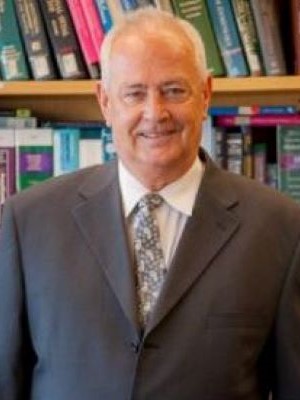
John Nagelhout
NURSE ANESTHESIA
Graduated in 1977 - CRNA, 1982 - Master’s in Pharmaceutical Sciences, 1985 - PhD in Pharmaceutical Sciences
Editor's note: Sadly, John passed away in 2024, shortly after sharing these memories.
Q: Why did you choose WSU?
A: For four reasons: top notch faculty, excellent program, scheduling flexibility and excellent clinical affiliates.
Q: What inspired you to pursue this career?
A: Nurse Anesthesia provides a challenging professional role, excellent job possibilities and the ability to help people when they are vulnerable during the perioperative period. I also had the opportunity for continual career growth.
Q: Who was your most memorable instructor?
A: I was particularly impacted by two WSU faculty members. John Garde, then chair of the Nurse Anesthesia program who encouraged and guided me throughout my university studies and was a career role model, and Dr. Fred Beuthin, who graciously shared his pharmacology expertise and led me through the doctoral program.
Q: What was your most challenging class?
A: That's easy: Physical Chemistry was the most difficult subject by far. I spent many hours struggling with the concepts in what seemed like a foreign language.
Q: Where was your favorite place to study?
A: The pharmacy school library since we had access to all supportive materials we needed for our courses.
Q: Share some reflections about your time at Wayne State University:
A: Wayne State is an excellent educational institution with a personal touch toward the students. I always felt I had access to every faculty member where I could spend as much time as needed to develop an understanding of the concepts they were teaching. Many of the faculty and staff went out of their way to aid in student success.
Q: In your opinion, what is one of the biggest changes that has occurred in your profession since graduating?
A: All of the advanced practice nursing specialties (nurse anesthesia, nurse practitioner and nurse midwife) have moved to the doctoral framework for licensure. WSU has been in the national forefront in spearheading the movement. WSU was the first educational program to offer a bachelor's (BSN) in Nurse Anesthesia and has now advanced to a doctorate.
Q: Share a career highlight or summary:
A: The education and friendships I developed at WSU afforded me the opportunity to thrive in my specialty. The tools and skills I learned prepared me to excel wherever my career brought me and I am forever grateful for my time and experiences at WSU.
WSU Applebaum’s Doctor of Nurse Anesthesia Practice program is led by exceptional faculty and clinical instructors dedicated to the profession and the teaching of students using state-of-the-art teaching facility and anesthesia classrooms. The DNAP degree is 36 months, designed to offer registered nurses an advanced education and full scope of practice as a Certified Registered Nurse Anesthetist (CRNA). Graduates will also meet the requirements for the National Certification Examination. Learn more about the application process and make plans to attend a college information meeting, held for prospective students at 6 p.m. on the first Tuesday of each month.
An anchor in urban health care
The Eugene Applebaum College of Pharmacy and Health Sciences is built on more than 100 years of tradition and innovation in the heart of Detroit. We have grown deep roots in our city, harnessing its powerhouse hospital systems and community service organizations as vibrant, real-world training grounds for students, with an ongoing focus on social justice in health care. And our research at all levels – from undergraduates to veteran faculty members – translates into creative solutions for healthier communities.
Wayne State University is a premier urban research institution offering approximately 350 academic programs through 13 schools and colleges to nearly 24,000 students.